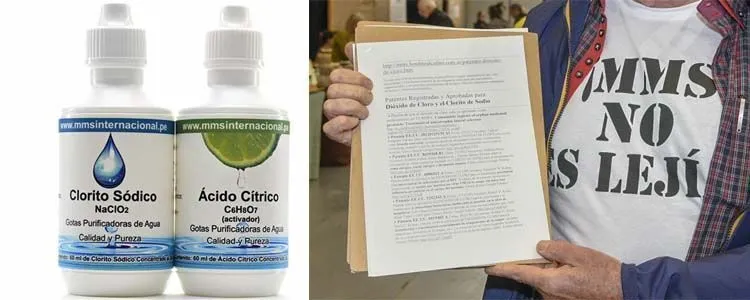There is a lot of controversy with the so-called MMS (miracle mineral supplement), and it is normal that when something carries the word miraculous, we throw our hands to our heads and take a step back.
This article aims to be a review of the studies of the sodium chlorite on the part of the scientific community, since chemically it is very similar to sodium hypochlorite (bleach), and therefore, you have to take many precautions because it is an industrial cleaning product.
Table of Contents
What is sodium chlorite?
The sodium chlorite is a liquid solution whose composition is (NaClO2) currently used for papermaking. It can also be referred to as sodium chlorite.
In its composition, it contains minerals such as sodium, oxygen and chlorine.
Its consumption, in quantities from several grams, is toxic to humans and animals, due to its highly oxidizing capacity. With a dose of 10 grams and up, it is usually lethal and causes death in a short period of time.

Use in alternative medicine
As a result of its oxidizing capacity, it has been attributed some medicinal properties that need to be contrasted with scientific trials of the medical community.
For some years now, there has been strong promotion by several authors where they use sodium chlorite or sodium chloride as a remedy for diseases that are difficult to cure.
We talk about various types of cancer, depression, ALS, fungal and bacterial infections, etc.
In fact, it has been colloquially referred to as Master Mineral Solution or miraculous mineral supplement.
The scientific and medical community thinks quite the opposite, even in Spain it has been forced to withdraw several products that contained this active material, being studied as a crime of public security.
Differences with sodium chloride
Chemistry offers us different nomenclatures for minerals that come together in different ways. Therefore, it is necessary to differentiate sodium chloride (the common salt) with sodium chlorite.
Sodium chlorite: (NaClO2)
Sodium chloride: NaCl
Industrial uses of sodium chlorite
Currently, the industrially standardized use of all forms of chlorine are as disinfectants. In particular, sodium chlorite offers the following actions.
- Antimicrobial treatment for food.
- Water treatment and purification.
- Disinfectant of surfaces in food areas.
The most concentrated doses, it is used as:
- Sterilizing agent used in water treatment industries.
- Bleaching and pickling of textiles and paper.
Does sodium chlorite have properties?
The U.S. Food and Drug Administration has not yet evaluated or approved sodium chlorite for healing purposes.
However, a number of benefits have been promoted for different diseases, such as:
- Flus and colds
- Hepatitis
- Various types of cancer
- Amyotrophic lateral sclerosis (ALS)
- Malaria
- HIV
- Autism
- Leukaemia
- Diabetes
Currently, there is no veracity or scientific document where its benefits are accredited.
On the internet and on television you can see many testimonies of people who claim to have cured their disease with the treatment of sodium chlorite. However no scientific evidence that secures such claims.
One of the most striking cases, ALS disease, sick patients who have tried this compound ensure an improvement in flexibility, the ability to speak, increased muscle activity and improved functions of balance and speed in movement.
For this type of rare diseases, the European Union has considered sodium chlorite as an “orphan drug”, especially for ALS, a rare disease that currently has no cure.
‘Orphan drugs’ are medicinal products that are intended for the diagnosis, prevention or cure of extremely serious diseases.
From here, a series of studies were initiated for evAluar the effect of sodium chlorite in this type of disease, with still very preliminary results.
Safety when taking sodium chlorite
As we have mentioned before, chlorine is a highly oxidizing compound, so it causes cell damage, kidney failure and other types of rapidly evolving disorders.
However, in very low doses, it can be harmless to the body, due to its high dilution in water.
This is what happens, for example, with tap or bottled water, which contains chlorine but in such low amounts that it does not have any negative effect on the body, but it does work to eliminate bacteria and organic matter that such water may have.
In short, at the recommended dose (and not precisely by the scientific community) it is harmless, but there are no foundations or real evidence to prove it.
The medical community recommends avoiding its consumption until the results are scientifically proven, claiming that its long-term consumption can generate acute and chronic problems such as the following:
- Skin burns
- Snoring and coughing
- Bronchitis
- Breathing problems
- Nosebleeds
- Worsening of chronic diseases
Is it easy to buy sodium chlorite?
Currently, several online stores offer the sale of these MMS products. There are even options that do not carry any chlorine but have joined the bet on miraculous supplements that have nothing to do with the initial.
We see, for example, MMS products based on citric acid, vitamin C, organic sulfur, etc.
The official recommendations are not to buy under any circumstances any source of sodium chlorite to use by ingestion, as it can cause damage and side effects commented.
At least, wait for the scientific community and clinical trials to establish serious guidelines.
